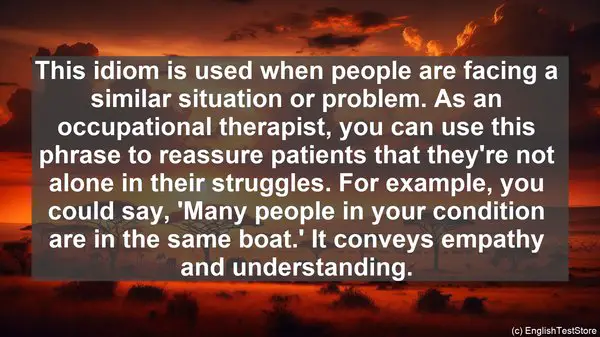Introduction to Idioms
In today’s lesson, we’ll be diving into the world of English idioms. Idioms are phrases or expressions that have a figurative meaning, different from their literal interpretation. They add color and depth to our language. For occupational therapists, knowing idioms can be especially useful in building rapport with patients and understanding their needs better.

1. ‘In the Same Boat’
This idiom is used when people are facing a similar situation or problem. As an occupational therapist, you can use this phrase to reassure patients that they’re not alone in their struggles. For example, you could say, ‘Many people in your condition are in the same boat.’ It conveys empathy and understanding.
2. ‘On the Same Page’
When working with a team of healthcare professionals, it’s crucial to be ‘on the same page.’ This idiom means to have a shared understanding or goal. You might use it in a meeting to ensure everyone is aligned. For instance, ‘Let’s discuss the treatment plan to make sure we’re all on the same page.’ It promotes collaboration and avoids misunderstandings.
3. ‘A Breath of Fresh Air’
Occupational therapy can be challenging, both physically and emotionally. When a patient shows progress or a new approach is introduced, it can be ‘a breath of fresh air.’ This idiom signifies something new and invigorating. You could say, ‘Your positive attitude is like a breath of fresh air.’ It acknowledges their efforts and motivates them.
4. ‘In the Loop’
As an occupational therapist, it’s essential to stay ‘in the loop’ with the latest research, techniques, and developments in your field. This idiom means to be well-informed or included in a group’s communication. You might use it when discussing professional growth, like, ‘Attending conferences keeps me in the loop.’ It emphasizes the importance of continuous learning.
5. ‘A Picture is Worth a Thousand Words’
In occupational therapy, visual aids can be powerful tools. This idiom suggests that a visual representation can convey a complex idea more effectively than words alone. For instance, ‘Let me show you a diagram; a picture is worth a thousand words.’ It highlights the value of using visuals in patient education.
6. ‘Behind the Scenes’
Occupational therapists often work ‘behind the scenes.’ This idiom means their efforts may not be immediately visible but are crucial to the overall outcome. You could explain to a patient’s family, ‘While you don’t see us every moment, we’re working behind the scenes to ensure their progress.’ It underscores the dedication and hard work involved.
7. ‘In a Nutshell’
When summarizing complex information, ‘in a nutshell’ is a handy phrase. It means to present something concisely. For example, ‘To explain the treatment plan in a nutshell, it focuses on these three aspects.’ It helps ensure clarity and understanding.
8. ‘On Cloud Nine’
Celebrating milestones is an essential part of occupational therapy. When a patient achieves a significant breakthrough, they might be ‘on cloud nine.’ This idiom signifies extreme happiness. You could say, ‘You must be on cloud nine after completing that task.’ It acknowledges their accomplishment and boosts their morale.
9. ‘In the Driver’s Seat’
Empowering patients to take control of their own well-being is a core principle of occupational therapy. This idiom, ‘in the driver’s seat,’ means being in control or having the authority. You might use it to encourage a patient’s active participation, like, ‘You’re in the driver’s seat of your recovery; we’re here to guide.’ It fosters a sense of autonomy.

10. ‘Food for Thought’
In discussions or meetings, when a thought-provoking idea is presented, it’s often referred to as ‘food for thought.’ This idiom suggests that the idea is worth considering and reflecting upon. For instance, ‘The speaker’s point about holistic care is definitely food for thought.’ It encourages deeper engagement and reflection.
Conclusion
And that wraps up our list of the top 10 English idioms for occupational therapists. Learning these idioms not only enhances your language skills but also helps you connect with patients and colleagues on a deeper level. So, the next time you come across one of these idioms, you’ll know exactly what it means. Thanks for watching, and see you in the next lesson!
